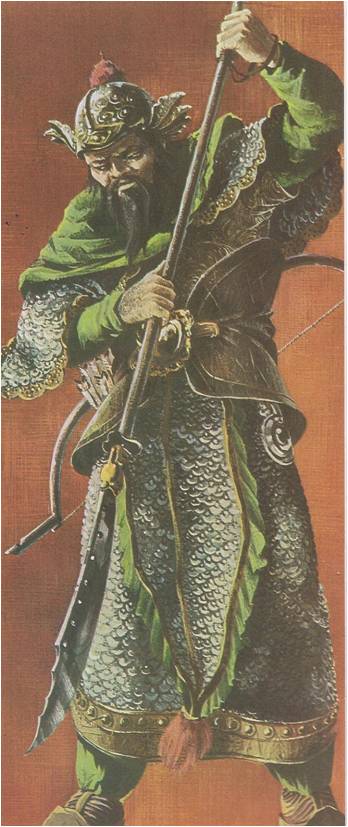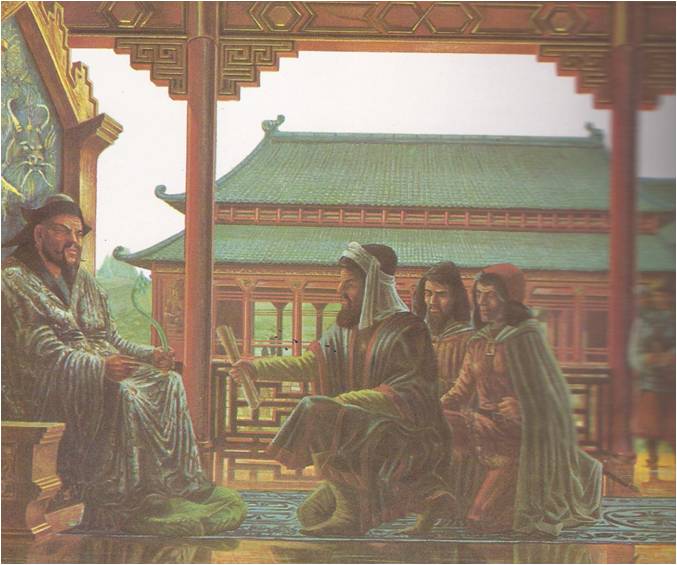IN 1135, Hangchow became the capital of the Southern Sung. Thereafter, the Sung kept an uneasy peace with their unwelcome northern neighbours, the Chin. Then, out of Mongolia came the mighty Genghis Khan, whose warriors and their descendants were to spread terror across Asia into Christian Europe and the lands of Islam. Before he died in 1227, Genghis had crushed the Hsi Hsia and all but crushed the Chin. His son, Ogodai, made a treaty with the Sung emperor, and the Sung and Mongol armies together put an end to the Chin.
This alliance with a barbarian power turned out just as disastrously for the Chinese as Hui Tsung’s alliance with the Chin. The Mongols moved south against the Sung. When Ogodai died in 1241, his son Mangu took command. When Mangu died in 1259, a year after his cousin Hulagu destroyed the Abbasid caliphate in faraway Baghdad, his brother Kublai carried on.
The Sung army resisted bravely. Both sides used cannon and catapults — huge engines which hurled rocks and bombs in the same way a crossbow hurled arrows. Some catapults were so big it took a hundred men to operate them. If the Mongols had not had such weapons, they might have been stopped. Much of South China consisted of flooded rice fields and canals and cavalry warfare would have been difficult if not impossible.
In 1276, Kublai took Hangchow. Next he took Canton. In 1279 his men destroyed the last ships of the Sung fleet. Soon after this, the despairing Sung emperor flung himself from a high Cliff into the sea.
Long before his victory was complete, Kublai had picked a name for his dynasty. Earlier barbarian conquerors had taken the name of a region or of a famous Chinese dynasty of the past. Kublai did not follow this custom. Instead, he chose the word yuan, meaning “new beginning.“ It was a fitting name, for the Yuan dynasty was the first non-Chinese dynasty to rule over all China. The “first beginning” hardly got started before it was over. The Yuan era (1279-1368) was the shortest since the Sui.
Kublai was much the greatest of the Yuan emperors. Throughout his reign (1279-1294), China, together with Tibet, Korea and parts of Mongolia and Manchuria, made up the eastern division of the Mongol Empire, which stretched west from the Pacific Ocean all the way to Poland, Hungary and Syria. Of the four divisions of the empire, each ruled by a descendant of Genghis known as the khan, or overlord, Kublai’s was far the largest, richest and most populous. He alone bore the title of Great Khan and his cousins the lesser khans, owed allegiance to him. So Kublai or Kublai Khan, as he was sometimes called — reigned over more territory than any ruler of China before or since.
KUBLAI KHAN
Even so, he was not content. In true Mongol fashion, he hungered after fresh conquests. He sent armies south into Vietnam and Burma. He launched two enormous fleets against Japan and another against the island of Java. All these ventures failed. His soldiers had adapted remarkably well to warm, wet south China, so different from their homelands. They could not cope with the heat and diseases of the tropics. Since few Mongols had seen the ocean, it is not surprising that Kublai’s naval expeditions failed.

Like other Mongol chieftains elsewhere, Kublai and his successors ruled China as conquerors. To the Chinese, their reign was simply a long military occupation by a particularly uncivilized foreign power. Foreign soldiers patrolled their roads and streets, foreign officials ordered them about and foreign spies, or their Chinese hirelings, snooped on their doings. The sensitive Chinese found the personal habits of their conquerors most distasteful. Not only did they wear coarse, filthy coats of fur and leather, they spoke a horrible language that grated on the ear and was impossible to understand. They drank, of all loathsome things, milk, the very thought of which made the Chinese feel sick. Coming from a land where water was scarce, they seldom washed. “They smelled so heavily,” one Chinese writer complained, “that one cannot approach them.” They often got drunk on a brew made from mare’s milk and most of them could barely write their names. Furthermore, they gave women too much freedom, even allowing their daughters to inherit land.
Almost as distasteful to the Chinese were the other foreigners who swarmed into their country. From the western fringes of the Great Khan’s domain came Nestorian Christians — members of a sect which had been banned by the ruling bishops centuries before but had survived in remote parts of Asia. From the Islamic lands came Moslem traders. From the Christian countries beyond the westernmost limits of the Mongol Empire came the first Europeans in memory to set foot on Chinese soil.
THE TRAVELS OF MARCO POLO
One European visitor, a young man from Venice named Marco Polo, entered the service of Kublai Khan in 1275 and stayed on in “Cathay” for seventeen years. On his return home, he dictated an account of his travels that made him famous. But his readers could hardly believe what they read. Who had ever heard of “black stones” (coal) being burned as fuel? Could the emperor of Cathay possibly be richer and more powerful than the mightiest kings of Europe? What nonsense was this about people paying their taxes with pieces of paper instead of gold?

Marco Polo had recorded what he had seen and heard quite truthfully. He understood, too, why Kublai had employed him. “You see,” he told his readers, “the Great Khan had not succeeded to the dominion of Cathay by hereditary right, but held it by conquest; and thus, having no confidence in the natives, he put all authority into the hands of Tartars, Saracens and Christians, who . . . were foreigners in Cathay.” For this reason “all the Cathaians [Chinese] detested the Great Khan’s rule.”
Kublai was shrewd. To keep his subjects from making trouble, he put them to work on projects that called for endless backbreaking toil. First, he had them build a magnificent new capital city next to Peking; the Mongols called it Khanbaligh‚ the “city of the Khan,” and Marco Polo remembered it as “Cambaluc.” Then, to make sure the inhabitants of Khanbaligh got plenty to eat, he forced no less than two million Chinese to dig a wide, deep canal from Peking to the Yellow River. There it was linked with another canal by which beats brought rice north from the rice fields near the mouth of the Yangtze. The resulting supercanal, the Grand Canal, ran eleven hundred miles, from Hangchow to Peking.
None of Kublai’s successors possessed his ability, drive and cold-blooded determination. In China, as happened elsewhere in the Mongol Empire, the heirs of the conqueror fell to quarreling. The country was torn by civil wars. Thus divided, the Yuan family could no longer hold the people’s hatred in check. Scholar-officials, philosophers, writers, artists, craftsmen, merchants and peasants united against them. In 1368 they chased the Mongols from China, and the “first beginning” came to a violent end.





